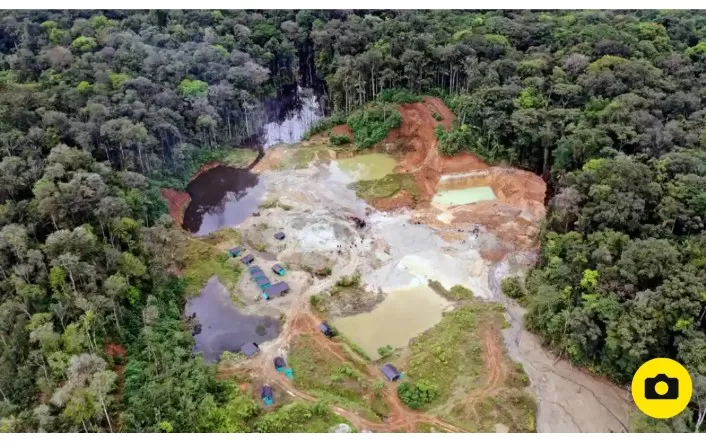A damning report has exposed the United States as a favored refuge for ill-gotten wealth acquired by environmental criminals wreaking havoc in the Amazon rainforest. The report underscores that the lax regulation and the shroud of secrecy enveloping the US financial system have enabled illegal loggers and miners to stow away sums ranging from millions to billions of dollars within American real estate and other assets. The consequence of these financial practices, the report argues, is contributing to the degradation of the world’s largest tropical forest.
The study, produced by the Financial Accountability and Corporate Transparency (Fact) Coalition, calls upon the US Congress and the White House to address glaring loopholes in financial regulations that have effectively turned the United States into an inadvertent accomplice in the destruction of the Amazon.
Remarkably, in 2021, the United States assumed the top position in the world financial secrecy index published by the Tax Justice Networks for the first time. This unsettling ascent was driven by concerns over money laundering activities and inadequacies in the country’s financial transparency laws.
Fact’s report spotlights the repercussions of this rise in financial secrecy on environmental crime in the Amazon, a region of global significance due to its impact on the climate. The study examines six case studies, which reveal connections between deforestation and American companies.
Florida, with its strong cultural and linguistic ties to South America, emerges as a hotspot in this investigation. The report references Goldex, formerly Colombia’s second-largest gold exporter, which supplied over 45 tonnes of gold, valued at $1.4 billion, to two US refineries, including Republic Metals Corp (RMC) in Miami. Colombian prosecutors later alleged that the gold was illicitly mined, routed through shell companies, and ultimately employed to launder money for organized crime syndicates. Goldex faced sanctions from the Colombian government, and one of its suppliers was extradited to the US on charges of drug trafficking and money laundering. Following an investigation by the US attorney’s office, RMC agreed to strengthen its internal anti-money laundering guidelines, while Goldex ultimately filed for bankruptcy.
An even more profitable case ties Miami to Amazonian nations. NTR Metals pleaded guilty to charges of failing to maintain an adequate anti-money-laundering program after revelations that it had dealt with $3.6 billion of illegal gold and counterfeit ingots originating from Peru.
The issue is not confined to Florida alone. In Maryland, the former Peruvian president Alejandro Toledo is alleged to have acquired properties to conceal and legitimize the $1.2 million he received in bribes from the Brazilian construction firm Odebrecht. Odebrecht has acknowledged paying bribes, and a US court has ordered the repatriation of funds to Peru, while Toledo denies any wrongdoing.
Other case studies associate a Nevada-based firm with the procurement of illegal timber from the Peruvian Amazon’s Loreto region, and a Connecticut company with forest clearance to make way for a palm oil plantation on indigenous land.
In Peru, government regulators and watchdog groups have repeatedly encountered roadblocks in their investigations into environmental crimes, as the trail often leads to anonymous shell companies in the United States. Daniel Linares Ruesta, the director of Peru’s financial intelligence unit, remarked that they had encountered cases where the route of dirty money was directly traced to US company involvement.
The report underscores two fundamental shortcomings in the US regulation of financial inflows from foreign nations: permissive regulations on identification that facilitate the use of anonymous shell companies and considerable gaps in the anti-money laundering framework that permit estate agents and refineries to receive payments without verifying and disclosing the origin of funds.
Earlier this year, the Igarapé Institute estimated that environmental crime in the Amazon generates annual profits ranging from $110 billion to $281 billion, though it has been a relatively low-priority issue for financial authorities in Latin America. Investigations conducted by the Insight Crime website suggest that the issue may be expanding, as connections solidify between environmental crime, narcotics trafficking, and money-laundering networks in Brazil, Colombia, Peru, and Ecuador.
The Fact report urges the United States to assume a greater share of responsibility, given that it is the primary destination for illicit funds, followed by the United Kingdom and its crown dependencies, such as the Cayman Islands.
Among the report’s recommendations are the establishment of anti-money-laundering obligations in the real estate market, financial oversight assistance for Amazon nations, and the implementation of the Corporate Transparency Act, which would establish a database of true “beneficial” owners of all companies. The report also calls upon the US Congress to pass the Forest Act, which would add illegal deforestation to the US money-laundering statute.
Ian Gary, the executive director of the Fact Coalition, emphasized that he was encouraged by the Biden administration’s acknowledgment of the threat posed by corruption. He now calls for decisive action, stating that “the US needs to step up.” The report underscores the necessity for the United States to cleanse its financial system of secrecy and underscores the need for collaboration with law enforcement counterparts in the Amazon region







